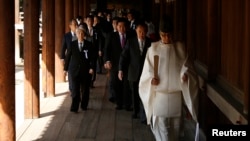A group of Japanese lawmakers on Tuesday visited a controversial Tokyo war shrine that many see as a symbol of Japan's imperialist past.
The visit to the Yasukuni Shrine by the 146 lawmakers comes after Prime Minister Shinzo Abe on Monday sent a ritual offering to the shrine.
The moves further complicate Tokyo's already tense relationships with South Korea and China, which bore the brunt of Japan's militaristic past.
Seoul's Foreign Affairs Ministry blasted the visit as unproductive and accused Japan of "romanticizing" its past aggression.
Chinese Foreign Ministry spokesman Qin Gang also criticized the lawmakers during a regular briefing on Tuesday. "The Yasukuni Shrine is a negative asset for Japan. If Japan's leaders insist on carrying it, this negative asset will get heavier and heavier. Unfortunately, it became heavier in just one night," said Qin Gang.
The Yasukuni Shrine commemorates Japan's 2.5 million war dead, including 14 convicted World War Two war criminals.
Many Koreans and Chinese see the visits to the Shinto shrine as evidence that Tokyo is unrepentant for atrocities committed in their countries.
But Japanese lawmaker Hidehisa Otsuji, the chairman of the group visiting Yasukuni, insists the visit is personal - not an official gesture. "My father was also enshrined at this shrine. So I have been coming here regularly and also with this group, I have been visiting here for decades. I made my visit this time with a calm mind. There is no further meaning in this visit," stated Hidehisa Otsuji.
The lawmakers' tour of Yasukuni comes just ahead of U.S. President Barack Obama's arrival in Japan on Wednesday.
The United States said it was "disappointed" when Prime Minister Shinzo Abe visited the shrine in December.
Though Abe appears to have decided to stay away this time, Chinese officials have tried to portray the visit as a slap in the face to President Obama.
Some information for this report was provided by AP, AFP and Reuters.
The visit to the Yasukuni Shrine by the 146 lawmakers comes after Prime Minister Shinzo Abe on Monday sent a ritual offering to the shrine.
The moves further complicate Tokyo's already tense relationships with South Korea and China, which bore the brunt of Japan's militaristic past.
Seoul's Foreign Affairs Ministry blasted the visit as unproductive and accused Japan of "romanticizing" its past aggression.
Chinese Foreign Ministry spokesman Qin Gang also criticized the lawmakers during a regular briefing on Tuesday. "The Yasukuni Shrine is a negative asset for Japan. If Japan's leaders insist on carrying it, this negative asset will get heavier and heavier. Unfortunately, it became heavier in just one night," said Qin Gang.
The Yasukuni Shrine commemorates Japan's 2.5 million war dead, including 14 convicted World War Two war criminals.
Many Koreans and Chinese see the visits to the Shinto shrine as evidence that Tokyo is unrepentant for atrocities committed in their countries.
But Japanese lawmaker Hidehisa Otsuji, the chairman of the group visiting Yasukuni, insists the visit is personal - not an official gesture. "My father was also enshrined at this shrine. So I have been coming here regularly and also with this group, I have been visiting here for decades. I made my visit this time with a calm mind. There is no further meaning in this visit," stated Hidehisa Otsuji.
The lawmakers' tour of Yasukuni comes just ahead of U.S. President Barack Obama's arrival in Japan on Wednesday.
The United States said it was "disappointed" when Prime Minister Shinzo Abe visited the shrine in December.
Though Abe appears to have decided to stay away this time, Chinese officials have tried to portray the visit as a slap in the face to President Obama.
Some information for this report was provided by AP, AFP and Reuters.











